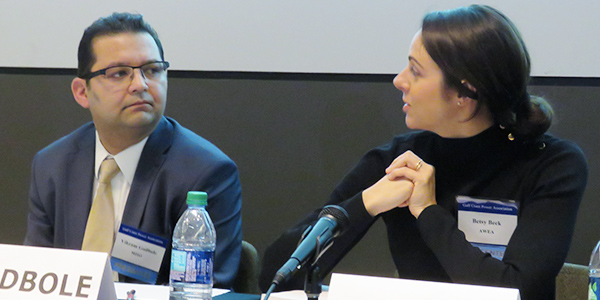By Rich Heidorn Jr.
NEW ORLEANS — MISO is considering a fast-track process for “shovel-ready” generation projects in response to criticism that its rules don’t work for renewables, which now represent almost 90% of the RTO’s interconnection queue.
“It’s going to have to go through a lot of stakeholder discussion, but I’m optimistic we can come up with something to help out people that are really ready,” Vikram Godbole, MISO’s director of resource utilization, told the Gulf Coast Power Association’s MISO South Regional Conference last week.
Godbole made his remarks during a panel discussion on the RTO’s efforts to eliminate its interconnection backlog — a consequence, he said, of rising requests by solar and wind developers seeking to beat the phaseout of federal tax credits.
MISO has about 70 GW in its three-step definitive planning phase, up by more than 10 times the 5 GW in 2012. Wind projects account for 31.6 GW, with solar almost equal at 31 GW. Most of the remainder is gas (7.1 GW). Solar represents 83% of the 10.3 GW of interconnection requests in MISO South.
Godbole said the growth is been largely driven by the end of the wind production tax credit in 2020 and the reduction of the current 30% solar investment tax credit. In 2022, the solar credit will drop to 10% for commercial and utility projects and be eliminated for residences.
He said the RTO has been unable to accurately predict how much capacity developers will add to the queue. MISO’s high-end estimate for the 2018 cycle was about 25,000 MW. “And you know what happened? We got about [35,000 MW],” he said.
Betsy Beck, director of electricity markets and transmission policy for the American Wind Energy Association, told the conference that wind developers appreciate MISO’s efforts to address the queue problems.
But she said the RTO’s “incremental” changes may be insufficient to address problems caused by the transition to renewable generators from large fossil fuel plants that take years to permit and build.
“We can build a wind or solar farm in a matter of months not years,” she said. “The process that we’ve built for one generation type just isn’t working anymore for generation that’s fundamentally very different. … I just wonder, going into the future, at what point we need to stop and take a step back and say — instead of incremental changes — do we need to kind of start over?”
The length of the interconnection process — now averaging 505 days — is forcing wind developers to file their interconnection requests before they have complete plans and understand all their vulnerabilities, she said. When projects fall out of the queue, they can force restudies that often increase costs for projects behind them.
Beck said renewable growth is being driven not just by the phaseout of subsidies but also by corporate buyers inking power purchase agreements based on low costs. “The problem is not going away,” she said.
In November, FERC Again Denies MISO Wind Developers’ Queue Complaint.)
Godbole said that while the RTO has made progress in reducing the backlog in its North and Central regions, it is still seeking ways to reduce that in the West. “We are making progress. We are getting through these cycles as quickly as possible. And our hope is at some point we’ll catch up. If it’s this year, that would be awesome.”






